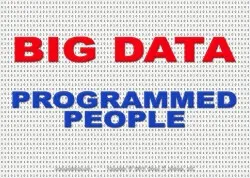Programming People with Big Data
Big data allows us to overcome the human tendency to oversimplify. Whereas we focus on one or two big causes to our problems, big data allows us to see the integration of many smaller causes. As the article, “Be My Guest” (The Economist, December 21, 2013 edition), exemplifies, this allows further detailing of our standard operating procedures. It means further programming our employees’ comments and actions, especially in customer service.
Oversimplification means focusing on the big things at the expense of the small. Six Sigma and Lean have proven big payoffs can come from small improvements. Translating to customer service, customers’ impressions originate from the collective impact of many small incidents not just a couple big ones. Big data allows us to leverage small incidents, thus transforming customer service and its training.
If you don’t tell a joke right, it falls flat. Customer service is like that. Big data teaches us to say the right things at the right times, but if we don’t deliver right, as early findings are showing, we convey mechanicalness or worse, creepiness. Tone might not fit words. Response might have mirrored exactly a co-worker’s earlier one. Too many personal particulars of the customer might have been referenced.
Big data isn’t about showing customers how much we know them. It’s about delivering without leaving the impression we know anything at all about them. It’s the joke comedians tell a million times as though they’ve just thought of it even though everyone knows it’s well planned, rehearsed and delivered. It’s the dancers, musicians and athletes who deliver performances seducing us into believing they required no practice.
Just as better information helps them, big data can do the same for customer service . . . as long as training methods adapt to incorporate that information.




Big Data is interesting: Typically, it seems to me, that the big data gets analyzed to “document” the big impact items. As I believe you are saying, I think everyone must realize these big impact items, important as they are (otherwise they wouldn’t habe the BE label), they quite frequently won’t be the “straw that broke the camel’s back” – the smaller impact items that are keys to better, improved outcomes.
I’m not sure they can surface from big data analysis or whether they can only emerge from considerations (http://johncbennettjr.com ) that include big data and associated analysis.
Yes, John, you’re right about shortsighted use of big data to document the big impact items. That was the focus of my post five weeks ago (The Small Importance of Big Data http://wp.me/p4iBnv-1uF). My post (Why Problems Occur (Alert #7): One over Many http://blog.omegazadvisors.com/?p=4997) relates to your point about the “straw that broke the camel’s back.” As we’ve discussed, people tend to define problems so they understand the problem not because their definition defines the problem well. Usually, as the research in the post indicates, most problems have many integrated parts while we tend to focus on one or two major ones. That can work if the parts are segregated and consecutive; however, if the parts are integrated, thus creating the potential that solving one part inversely affects another part, the solution could make the problem worse rather than better. For instance, a thirsty person might decide that drinking water is a good idea, but if that water is oceanic salt water, that will likely create other problems.
I do believe big data has much potential, but as with any new technology, it’s usually confined within our limitations until some break out innovation or advantage clearly comes to the fore. I agree with you though, associated analysis will play a very important role in tapping this potential. It all depends on how we conduct that analysis.
In regard to excellent, perfect customer service, the important part is better communication clearly, effectively and professionally. I agree with Mike Lehr Big data allows us to overcome the human tendency to oversimplify.
Congratulations Mike Lehr for helping many people with your most outstanding professional leadership in influence and problem solving. Professional training is important key of better customer satisfaction and success in business world.
Thank you Gloria for stopping by, visiting and leaving your compliment about my work. I appreciate it. ~Mike